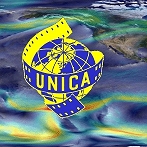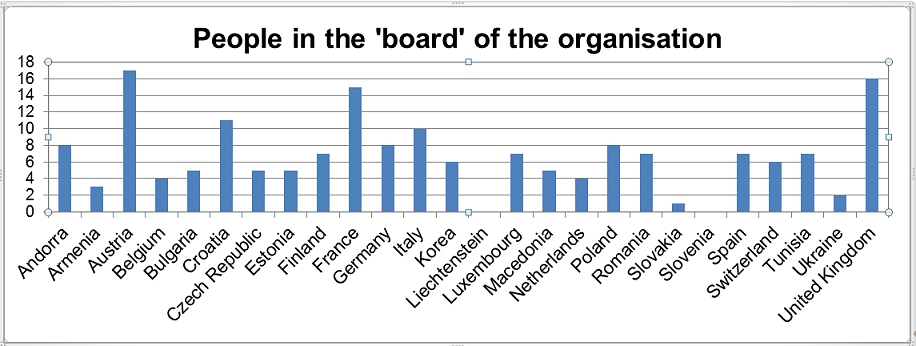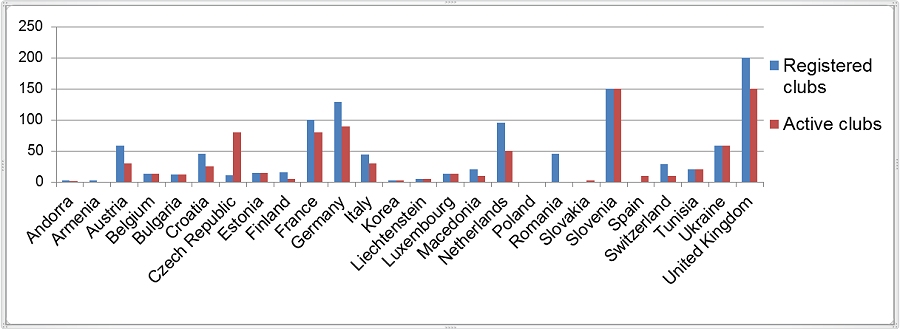
QUESTIONNAIRE
about UNICA Members - 1 of 4
This report summarises the outcome of a questionnaire sent to all UNICA member organisations
At our meeting in Vienna, on 31st October, 2015, the new UNICA Committee concluded that there was a need for an update of the information about the Member Organisations of the UNICA. This was necessary in order to draw a general picture of the organisation, to make a plan for what to do in future, and to set the course for moving forward.
This questionnaire was distributed among the people responsible in organisations representing the member countries in the UNICA. 26 countries responded positively. This report was made including only those 26 countries which submitted their answers to the Committee.
Thank you all for taking the time to send us your answers. 26 replied, 4 countries failed. We are not experts in putting together questionnaires. We realise that the formulation of the questions was not always correct or clear. We also realise, that for some of you it is hard to express yourself in a different language. As a result it was not always easy (or even possible) to make a good analysis of all the given answers. Some questions were not answered specifically enough or not at all. We apologise if a false interpretation was the result.
There were 31 members of the UNICA when the survey began. Armenia has since dropped out. The countries from which we still have no answers are: Georgia, Hungary, Norway, Russia and Sweden.
Since the first publication we have received further information:
Belgium:
FACINEB (Fédération des Cinéastes Amateurs de Belgique) is the official UNICA partner and represents the Flemish, Walloon and Brussels amateur filmmakers.
- On the Wallonia-Brussels side the FCVFB (Fédération des Cinéastes et Vidéastes Francophones de Belgique) is active through their clubs.
- On the Flemish side, two new organizations, VAC (Vlaamse Amateur Cineasten) and NAB 2.0, are organizing activities for individuals and/or clubs of amateur filmmakers in Flanders
FACINEB only exists on paper. Its only reason for existence today, is that the UNICA insists on only accepting one organization per nation. FACINEB organizes only one national activity: the one minute film contest.
Romania:
The reorganisation of the Romanian Association (ANC founded in 1992) was finalised by court order and came into force on 02.02.2016 as ANCR (Asociația Națională A Cinecluburilor Și Realizatorilor Neprofesioniști De Film Din România".) It allows access to individual filmmakers who are not part of film clubs.
Romania couldn’t answer the questionnaire before, because they were still in territorial reorganisation.
At this point they cannot provide answers to all the questions. Besides promoting their own films, the Association intends to promote Romanian films in the country, as well as film schools short films through festivals and other activities organised in schools, universities or places of culture, but also abroad through film festivals, including the annual "International Union of Cinema" - UNICA.
This report includes several charts and data information, that will make us understand, how most of the countries work, how their organisations function, how many people are involved, what sources for financing the cinema activities, what problems the organisations have, which activities are developed, which issues members would like to discuss during the UNICA Congress, and where we can benefit from ‘Good Practice’ etc. This report also includes the summaries of the answers to the open questions.
It is good to see, that many member organisations have things in common, or are functioning the same way, more or less. For instance, many countries have the same structure of the leading body, (a board.) All of them have a president, as well as several other members. The number of people included in the management of the organisation varies between the countries. The following table shows the number of people in their structure:

Most of the countries have only one region, in which all of the filmmakers participate, and where the competitions take place. The bigger organisations have regional level of competitions, and then the national ones. The data received is the following::
| Only
one region |
Most
countries |
| From
1 to 5 |
Belgium Korea Liechtenstein Switzerland United Kingdom |
| From
5 to 10 |
Armenia Austria France The Netherlands Slovenia |
| More
than 10 |
Germany |
When it comes to finance, we knew from the very start, that we would encounter some troubles in finding the right answers. However, many of the organisations have found this useful, and gave us answers, about who finances them, and who gives them the basic support. The majority of organisations are financed by the Ministry of Culture, or by the Government, in general. Additional support from other associations as well as from municipalities, from cities or from regions is also registered.
The financing, i.e. support for the board members, had very
interesting answers. Almost all of the countries answered, that they
do not have paid leaders in their organisation. Some of them do have
paid personnel (three of them), and four did not provide an answer
to this question.
In spite of not having regular salaries for the people in charge,
some countries do have enough funds to cover the expenses of their
representatives. The next table shows us the countries that can
manage their costs:
| NO |
Most
countries |
| YES |
Croatia Czech Republic France Germany Italy Slovakia The Netherlands |
| PARTIAL |
Switzerland
Tunisia |
Our biggest goal was to determine how big the National Organisations actually are, and what is their club structure. This is our major research task, since we have to see how well the clubs do among our members. The following chart shows the present situation:
